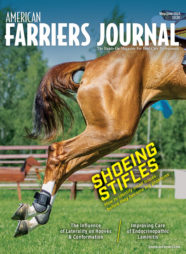Farriers tell us that it’s a rare shoeing day that a horse owner, trainer or groom doesn’t ask them for advice. Sometimes it’s even about hooves and hoof-care.
OK, so that’s overstating it a bit. The majority of questions a farrier is asked are going to be about hoof-care, but some of them won’t be.
So how do you answer them?
That was the topic of a Hoof-Care Roundtable discussion during the 2012 International Hoof-Care Summit in Cincinnati, Ohio. Moderated by Delaware, Ohio, farrier Dean Moshier, roundtable participants came up with a number of suggestions you may want to consider the next time you’re asked a question.
-
Don't get in over your head. Make sure you are qualified to answer a question. If not, defer.
-
Make sure you understand the question. For example, if clients "need help" training a horse, are they looking for a horse that's just a little easier to handle or one that's going to be able to compete at high-level horse shows?
-
Network. Prepare for questions by networking with other equine businessses and professionals so you'll have have relationships that can help you and your clients.
-
Pass the question on. Keep a referral book of business cards in your shoeing rig. These might include cards from veterinarians, clinics, trainers, etc. Be sure the person or service is OK with referrals.
-
But remember, you're still on the hook. If you do refer a client to another equine professional, be sure you are confident of that person's abilities. Remember, the results of that referral will be associated with you — whether it goes well or poorly.
-
Get to the point. Be brief and professional in your recommendations.
-
Be Positive. Emphasize the upside of the person or the service that you are recommending, rather than the downside of another.
-
Ask questions yourself. Talk with clients about who and what they have had success with. It may help you come up with some new referrals — or take someone off your list.
Something else to keep in mind in these situations is the question of ethics and liability. Many professions — including veterinarians — have professional guidelines or codes of conduct that cover referrals. Some farrier organizations do have codes of conduct, but since many farriers work independently, you may want to research the idea and come up with your own set of standards.
Always remember that a good referral or recommendation will be a positive experience for the client, the person or service you refer them to, as well as yourself by enhancing your personal and professional reputation.
Good referrals and recommendations build your brand. A bad one — even when well intended — can tear it down.








Post a comment
Report Abusive Comment